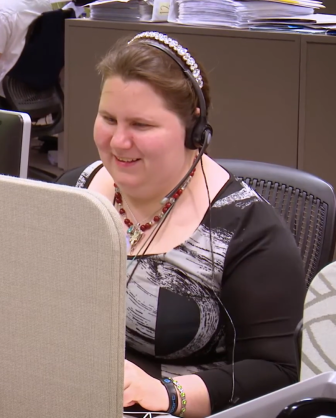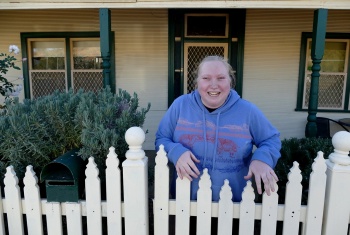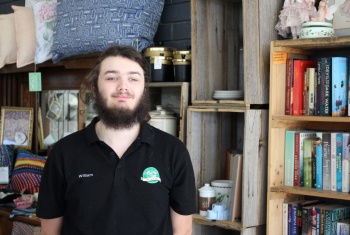Grace is an accomplished singer and performer. Her achievements include co-starring in a 2022 West Australian Opera production.
Grace, 38, has been blind since birth and was one of the first people in Perth supported through the NDIS. She has Leber’s congenital amaurosis, an inherited condition which affected the development of her eyes.
She has also worked for the National Disability Insurance Agency (NDIA) for 9 years, and brings lived experience to her current technical support role.
‘I help people at work with disabilities with their assistive technologies (AT). So if they are using a screen reader or other AT and need a hand, I help with that,’ Grace says.
Grace works in the NDIA’s newly established Office of Agency Accessibility & Inclusion. Their purpose is to strengthen inclusion and diversity in the Agency.
‘I really love helping to make things more accessible for people, and helping the Agency to be an employer of choice for people with disabilities,’ Grace says.
Grace maintains a deep personal connection to Perth’s theatrical community, with support and AT funded by the NDIS.
‘Sometimes I do a lot of voluntary work for theatre and that involves going to random venues a few times a week to watch some shows,’ Grace says.
‘My support worker makes sure I get there and back safely, and helps me find my way around. A lot of what goes on on-stage is not audio-described, so they keep me across it.’
AT has been just as important, helping Grace stay on top of performance content.
‘I have a BrailleSense 6 for notetaking and writing,’ Grace says.
‘That’s really important because Braille is my first language, and if I’m going to a rehearsal or workshop and I’m getting notes, scripts, or song lyrics, I’m able to follow along like everyone else.’
Grace is better positioned than most to reflect on advances in AT, and the difference it has made in people’s lives.
‘When I started working at the Agency, smart technology was just coming out,’ Grace says.
‘We were just starting to get Google Home and Alexa assistant, and smart appliances that you could control with your phone and your voice.
‘That world was just starting to open up. And now it's a big thing.’
Some of the advances in AT that are helping Grace move around and be more independent have been more recent.
‘Even in the last year or 2 we’re getting technology that can read for us, artificial intelligence technology that can see, and also live visual interpreters that tell us what's going on in the world around us and help us get around,’ Grace says.
‘That's been amazing.’
Grace has also been involved in user testing websites to help designers work towards a more digitally inclusive and accessible world of online services.
She says digital services and websites are more inclusive than they used to be, but there is still some way to go.
‘We’re getting better at harnessing lived experience to improve digital design, but there are still people that put it in the too hard basket,’ Grace says.
‘Now there is a little bit of shame in not doing it, so we just have to build it in as an expectation.’
With years of professional and lived experience of disability and the NDIS, Grace reflects on the difference it has made in her life.
‘Without the NDIS I wouldn’t be doing nearly as many of the things that are important to me, I wouldn’t have the independence that I have, and my job would probably not be as meaningful,’ Grace says.
And Grace credits the NDIS as having a broader positive impact in Australian society.
‘The NDIS has helped bring disability to the forefront of people’s minds, and we wouldn’t have made as many strides towards inclusion and accessibility without it,’ Grace says.



